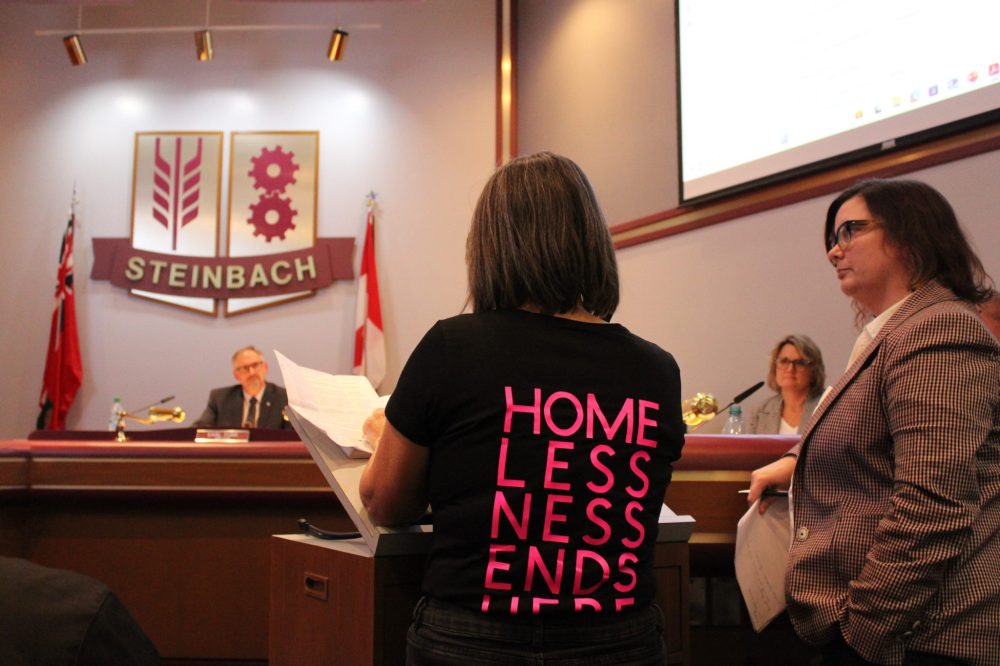Council passes zoning bylaw requiring conditional use for shelters
Advertisement
Hey there, time traveller!
This article was published 05/04/2025 (208 days ago), so information in it may no longer be current.
Steinbach City Hall was packed as council approved first and second reading of the official community plan and zoning bylaw on Tuesday.
Most were there to comment on a new zoning bylaw addition that would require emergency shelters to have a conditional use in order to operate.
Before the revision, that was not necessary.

Steinbach added that requirement against recommendations of WSP senior planner Kari Schulz, though they followed other recommendations.
The community plan and zoning bylaws must be reviewed every five years. The last one was adopted in Steinbach in 2018.
In a process that began in April 2023, planners worked with the city and the public through an open house to modify the plans.
While most of the people at the meeting opposed the bylaw because of the emergency shelter provision, others spoke out in favour.
Brad Unger, a former board member of The INN, the proposed transitional home at the centre of the debate, told council people need the opportunity to weigh in. “This is very important to a whole lot of people in our neighbourhood,” he said.
Bryan Bartel, owner of MJ’s Kafe echoed his sentiment saying a hearing is key. “They need community acceptance and assistance to be successful,” he said.
Those in favour were the minority however. The city confirmed that they had received 49 written objections and 10 wirtten statements of support. At the meeting seven inviduals expressed their opposition while three were in support.
Because there were more than 25 objections, council must send a notice of second reading to all objectors. If council receives 25 or more second objections, (only those who objected initially can object again), council must refer the objections to the Municipal Board.
Coun. Susan Penner made the motion to approve, saying the requirment for a public hearing is not unusual.
“Any developer or business that wants to build residential in a commercial zoning category has to come to the city for a conditional use,” she said. “Neighbourhoods should be able to have a formal mechanism to voice their support for, or concerns about an emergency overnight shelter going into their neighbourhood.”
Coun. Damian Penner thanked everyone from coming out, pointing to the hearing process for the zoning bylaw as something that’s also beneficial for an emergency shelter.
Coun. Michael Zwaagstra also weighed in, pointing out other uses also require conditional uses, including pet daycares in a variety of zones, a hospital in a commercial zone and a funeral home in a commercial zone.
“It is because we don’t like funeral homes? Is it because we’re trying to stop them from developing? No, it’s because a funeral home may be an appropriate use in a commercial zone or it may not be,” he said. “It depends on the overall neighborhood. It depends on exactly what’s being proposed and that’s why a public hearing would need to happen.”
Mayor Earl Funk defended his decision by saying he’s heard from lots of people, both for and against the proposed shelter. “That’s why it makes sense to have a public hearing.”
The INN board chair Leona Doerksen spoke out at the meeting and expressed her disappointment after.
“Zoning is really about the land and the building and how that’s being used,” she said. “The reason that we oppose the conditional use of this bylaw is that it was created because of the people that will be in the building. We feel this borders on discrimination.”
Doerksen said they know the city has good intentions but said she’s worried that future councils might use the conditional use requirement to block necessary social services.
She said many of the concerns about projects like theres have been proven wrong.
“The truth is when we give people a roof over their heads, they feel safe, the crime in the neighbourhood goes down and the neighborhood begins to feel safer.”
Doerksen stressed that they are not an emergency shelter but are transitional housing, something the current zoning bylaw does not define.
While they’ll try to get permission using that designation, Doerksen said they are prepared to go to the conditional use hearing.
“We’re just going to have to trust in the good faith of our community, in the education that we’ve tried to provide to our community, the compassion and the empathy that we’re asking people to have to help the most vulnerable people in our community,” she said.
Fellow board member Lisa Clark is also concerned about what a conditional use hearing could mean.
“It does open the door for a community forum for people to walk into our government building and express prejudice against the vulnerable in our community,” she said.
